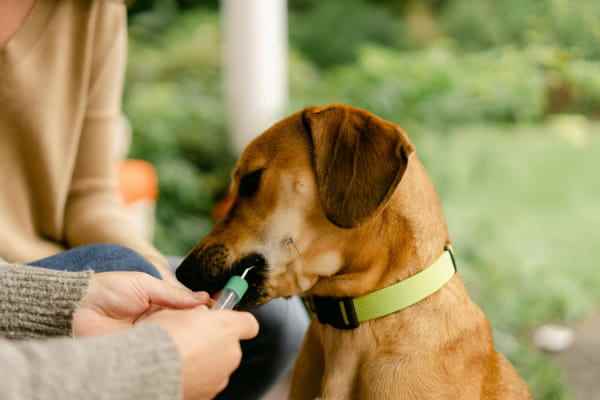The ritual has become familiar. Open the kit, swirl the swab, dip it in the solution and mix, then wait impatiently for the result. Except that this time, it is in the hollow of the jowl that the smear is taken and, above all, it is not a screening for Covid-19 but a DNA test for dogs.
The popularity of these tests, which appeared fifteen years ago, has recently exploded in the United States, where nearly 40% of families have at least one of these furry friends.
Embark Vet, founded in 2015 and which markets one of the most popular kits in the United States, assures AFP, for example, that it has experienced 235% growth between 2019 and 2020. And the pandemic has further amplified the movement, says a veterinarian.
They are not cheap, from 100 to 200 dollars depending on the kit. But in the country where the dog is king, this is not a problem: Americans spent nearly 104 billion on their animals in 2020, according to the American pet products association, the equivalent… of the GDP of the Slovakia.
– “End the rumours” –
Once the sample is sent by post, the wait can last between two weeks and a month. First objective, to be clear about the breed of the doggie.
Sometimes, when the master has acquired a purebred dog, it is a question of verifying that there has been no error in the goods. This is the case of Ashley Ternyila, who lives in New Jersey. The German shepherd she bought from a breeder looked a little too much like a wolf, despite his white fur, so “to put an end to the rumours, we had him tested,” she told AFP.
But for the owners who have chosen to adopt from shelters, it is rather a question of trying to fill in the gray areas of the life before of the person who is now an integral part of the family.
“Having a dog also means wanting to know where it comes from, what its history is,” explains Mila Bartos, a 51-year-old lawyer who lives in Washington. She adopted her three dogs, Natty, Maisie and Mabel, and for each proceeded to a DNA test, thus offering an overview of their family tree.
She discovered that Natty, a mix of pit bull, beagle, chow-chow and German shepherd, had a cousin living nearby, in Baltimore, or that Maisie, half Labrador and with a shiny brown coat, descended from a long line. show dogs.

Photo submitted by Levi Novey on April 15, 2022 showing his dog Summer, whose DNA test revealed a mixture of at least six different dog breeds
© AFP – Handout
For his part, Levi Novey, a 42-year-old consultant based in Virginia, assures that the test allowed him to “better understand” the behavior of Summer, his tiny black dog of 6 kilos, “her energy, her hunting instinct” and “the way she chooses the people she hugs.”
It is in particular this “desire to understand, predict and anticipate the actions of their dogs” which reinforces the curiosity of the owners with regard to the breed of their doggie, analysis for AFP Allen McConnell, professor of psychology specializing in the relationship of humans to their pets.
Dog breeds do indeed carry stereotypes — “Labradors interact well with children, Pit Bulls are aggressive guard dogs” — which, while sometimes inaccurate, can help interpret dog behavior. the animal, he explains.
– Genetic markers –

Photo provided by Embark Veterinary on April 15, 2022, showing a person taking a swab from their dog to test for DNA
© Embark Veterinary – Handout
Levi Novey was also reassured to see that Summer had no predisposition to any genetic disease. Because this is one of the selling points for these tests: the most expensive allow you to review the DNA in search of genes causing heart abnormalities, kidney function disorders, premature deafness…
But beware, warns Sarah Bowman, veterinarian in Washington, it is not because a dog has “the genetic marker (of a pathology) that it has the disease”. At most, these tests make it possible to be aware of the risk and to exercise greater vigilance in this area, she explains.
Contacted by AFP, the association of American veterinarians also encourages to consult one of its practitioners “before making any decision on the basis of the results of these tests”.
And then, the apprentice testers should perhaps also beware of the legal repercussions. In the United States as elsewhere, certain breeds of dogs are seen as aggressive, like pit bulls or staffordshire terriers, and are therefore banned from certain apartments.
However, in this very procedural country, if the adopted dog is half pit bull, “it could be a problem” with an overly observant owner, warns Mila Bartos in her capacity as a lawyer. “And if you don’t want to know that information, then you probably shouldn’t do a DNA test.”
All rights of reproduction and representation reserved. © (2022) Agence France-Presse

